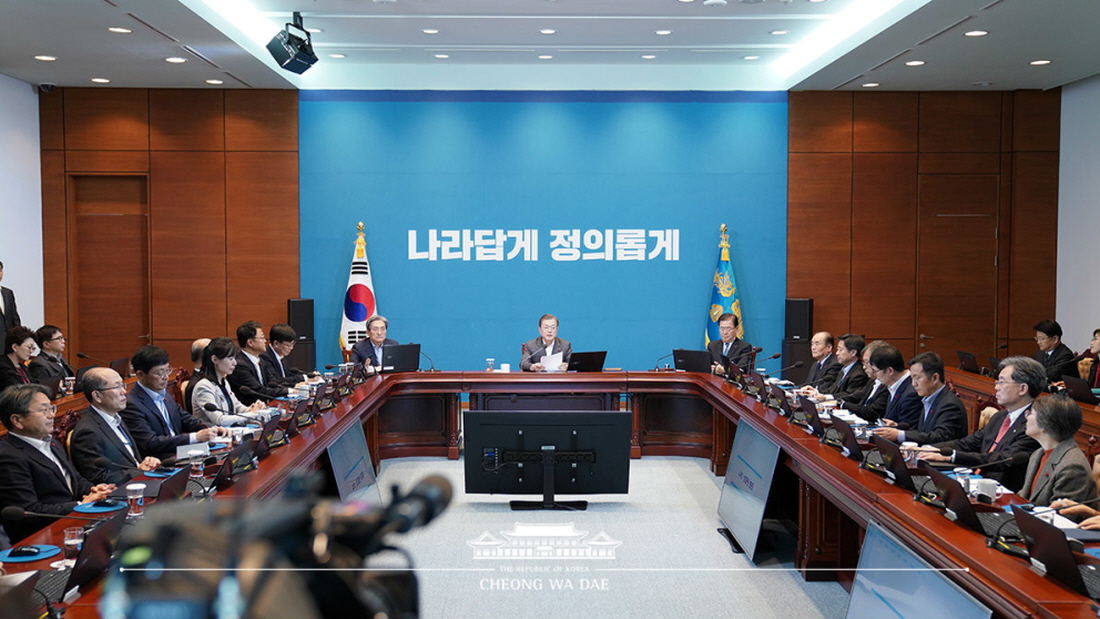이 웹사이트는 제19대 대통령 임기 종료에 따라 대통령기록관이 「대통령기록물 관리에 관한 법률」에 의해 이관받아 서비스하는 대통령기록물입니다. 자료의 열람만 가능하며 수정 · 추가 · 삭제는 불가능합니다.
다만, 「개인정보보호법」에 의하여 개인의 정보를 보호받기 원하시는 분은 관련 내용(요청자, 요청내용, 연락처, 글위치)을 대통령 웹기록물 담당자(044-211-2253)에게 요청해 주시면 신속히 검토하여 조치해 드리겠습니다. 감사합니다.
SPEECHES & REMARKS
BRIEFINGS
Opening Remarks by President Moon Jae-in at Meeting with His Senior Secretaries

(Unofficial Translation)
The year 2019 is drawing to a close. I thank all Koreans for their hard work and extend my profound respect and gratitude.
It has been a rewarding year, one when we’ve been able to nurture the seeds of hope while resolutely enduring many difficulties inside and outside the country. It’s all due to our people’s efforts and dedication that we can promise that next year will be better than this one. I am infinitely grateful to and proud of the people who’ve participated, shared and come together for the sake of the community known as the Republic of Korea while quietly fulfilling their duties at workplaces, homes and everywhere else.
In particular, it has been a year when we have once again become keenly aware that people possess world-changing strength. Japan’s unwarranted export restrictions could have caused us considerable problems, but support from the public has instead turned them into a blessing in disguise. We have been able to use them as an opportunity to lay a strong economic foundation that cannot be shaken, such as the localized production of key materials and equipment and the promotion of relevant industries.
The power of the people summoned the resolve for all of this by renewing the significance of the 100th anniversary of the March First Independence Movement.
Despite considerable conflict and confusion, the people’s desperate demands have served as a driving force for prosecutorial reform as well as to elevate and advance the value of fairness. We have reached the final phase in which the institutionalization of prosecutorial reform can come to fruition, and it has served as a chance for us to look back at the lack of fairness across all sectors of our society and look to the will of the public. This can be credited to the strength of the people who have carried on the spirit of the candlelight revolution and invariably put their hearts and minds together.
My Administration and I will close the year while taking to heart the will of the people and work on state affairs with a more humble attitude. We will live up to the needs of the people and the times by doing our best with a sense of duty that the footsteps that we leave behind today will become a part of history. I hope that everyone wraps up this year well and greets a happier new year in 2020.
As the end of the year approaches, the people only feel unease when looking at the National Assembly. Political strife has unceasingly reared its ugly head all throughout the 20th National Assembly, and shameful practices are continuing up to the end. With a record low rate for passing bills, this Assembly has already earned the stigma of being a vegetative Assembly. Still worse, even the act aimed at advancing the National Assembly and preventing it from being reduced to an “animal National Assembly” has been completely ignored, bringing back unseemly scenes. I might not be the only one who believes that our politics still has a long way to go.
The only one falling victim from all of this is the general public. Unprecedentedly, budget-related bills have failed to pass at the National Assembly, including the main one for next year, and deliberations over the bills reaching their sunset – which can directly harm the public if not passed by the end of this year – are being postponed without any promise of resumption. As a consequence, we are now facing a situation where some support to the vulnerable, including newlyweds, the self-employed, farmers and fishermen and social welfare corporations, could be immediately halted.
The budget proposal to expand eligibility for the basic 300,000 won-per-month pension and the pension for those with disabilities has passed, but it is regretful that we cannot provide assistance in a timely manner since the legislation hasn’t been fully completed.
Legislation on acts linked to the people’s lives – the framework acts for young people and microbusiness owners and the venture investment promotion act to name a few – is being delayed even though these acts were submitted to the plenary session by agreement of both the ruling and opposition parties. They are urgent bills – directly related to the economy and the lives of the people. No matter how serious political confrontations are, the National Assembly should refrain from abandoning the least of its duties at the sacrifice of the people’s livelihood.
I plead with the National Assembly to set free those bills on the people’s livelihood and the economy that have been taken hostage. If politicians are genuinely concerned about the people’s livelihood and the economy, I ask them to deal with relevant bills separately. They should be mindful of the fact that the public is watching.



